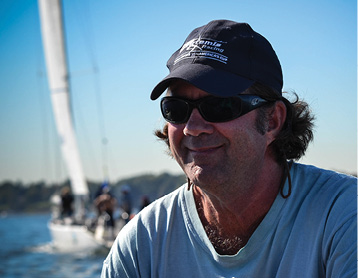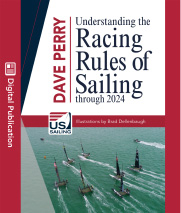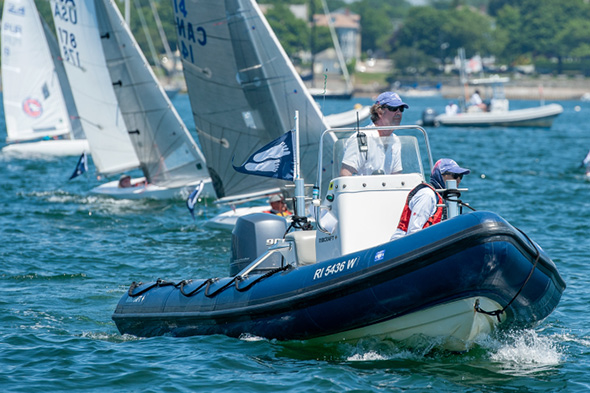
Dave Perry © oakcliffsailing.org
With Conversations with Classic Boats, “the Podcast that Talks to Boats,” in its fourth seasons, we listened to our focus group. They were calling for conversations with famous people. We obliged. For Episode 1 of the Classic Conversations Sailors Log, we recruited the ever-optimistic Dave Perry, back on the circuit giving his well-known live shows on the Racing Rules and heading to France in 2024 as Rules Advisor to the U.S. Olympic Team. We caught up with Dave to get his take on the state of college sailing, and of course, to talk about the 10th edition of his essential book Understanding the Racing Rules of Sailing, in print since 1984.
Full disclosure: I’m a few clicks older than Dave and we rarely raced intercollegiately with my Princeton team against his Yale squad, but we did spend a memorable time in New Orleans during the 1974-5 Sugar Bowl Regatta. I was sworn to secrecy on the details and Katrina destroyed any of the evidence many years later. We reconnected in the mid-1990s when our peer group moved into the Ideal 18 class as befitting
our age.
Who on Long Island Sound doesn’t know who Dave Perry is? From a star junior sailor at Pequot Yacht Club, winner of the Clinton M. Bell Trophy for the best junior record in 1971, he went on to captain Yales’s National Championship team in 1975. Other racing accomplishments range from winning the 1978 Tasar World Championships to winning the 2009 Seawanhaka Cup (on paper the oldest North American keelboat match) at Seawanhaka Corinthian Yacht Club. Dave claims to have been “out of competitive sailing” from the mid-1980s to the 2000s, but he certainly made his mark in two other areas: match racing and rules
publishing.

The definitive tome on the subject, the 10th edition of Understanding the Racing Rules of Sailing is available at US Sailing.
Dave spent twenty years as Director of Athletics at Greens Farms Academy, an independent day school in Westport, CT—the sailing tiospaye that he considers his home waters. A Rules Advisor to a series of America’s Cup teams, he reprised that role with the U.S. Olympic Sailing Team in 2008, 2012 and 2021. France 2024 will be his next gig. In 2020, Dave received US Sailing’s most prestigious award for outstanding contribution to the sport, the Nathanael Greene Herreshoff Award and was inducted into the National Sailing Hall of Fame. Our conversation has been edited for length and clarity.
TD: Tom Darling, Founder of Conversations with Classic Boats; Princeton ‘75
DP: Dave Perry, Match race pioneer, rules guru and author; Yale ‘77
TD: Dave, thank you for joining me.
DP: It’s great to be here. I assume by my age that I’m classic, and I appreciate joining you in this.
TD: Well, for me it goes back to 1977 in the days when Yale was a Sailing dynasty. It hasn’t really changed. We had Chrissie Klingler, who is Charlie Ulmer’s granddaughter, on the podcast last year. She was part of the team that won a Women’s championship for Yale, but you and I were Ivy rivals, when Ivy was the thing in sailing, right? I remember Yale. You probably don’t remember Princeton…we were way behind.
DP: Can I jump in and say that we sailed a regatta in New Orleans?
TD: You told me not to bring that up!
DP: (Raucous laughter) Well, yes. We knew each other when we were back in college…
TD: Do you still keep up with your old teammates?
DP: I do. Back then Peter Isler and Steve Benjamin were skippers when we won the National championships, and I see them all the time. Benjy has gotten involved in the Atlantic class. My family was involved in that class and I see him frequently. Pedro I see as much as possible, and of course his daughter went to Yale and just got married to another Yalie so I’m in touch with them. Susan Daly and I are racing together in London in May. And Stan Honey, who wasn’t on the Dinghy team back then. He was on the Big Boat team. And of course none of us knew what we were going to do with our lives. Stan is the most famous of us all, just won the Bermuda Race. I always say I was in school with Stan but never in any of his classes!
TD: Now Zach Leonard, he’s been sort of the Andy Reid (coach of the NFL champion Kansas City Chiefs) of this time for college sailing. How did he get there and how did that work out so well?
DP: You will remember back in the day in college sailing most of the teams were just club sports and there wasn’t an adult in sight! Maybe the academies had some coaches, and that’s changing. Now more and more teams are going varsity. Yale went varsity in the early 2000s and of course, that comes with a coach. Zach graduated in the late ‘80s and coached at Brown for a little while. He became head coach at Yale for the varsity and is just crushing it. He has a very gentle touch on the helm and he’s a good teacher. He has a fellow named Bill Healey who works with him. They’ve been together forever.

Dave has shared his expertise with competitors in Clagett Sailing’s Clagett Regatta Newport and Clagett/Oakcliff Match Race clinegattaas for many years. © Clagett Sailing/Ro Fernandez
TD: You watch college sailing. What have been the big changes?
DP: Well Tom, you know Yale Corinthian Yacht Club hosts a regatta called Snow & Satisfaction that got started back in the ‘70s, and they invite us old guys back. I was there a few years ago and the undergrads were all talking about “there’s a regatta this weekend.” Saturday night they go to their hotel and do homework. I said, “Whaaat? You do what?” “Yeah,” they replied, “we go to our hotel and do homework.” Those are two things that you and I never did on the Saturday night of a college regatta…
TD: Are you saying I couldn’t go to Marmaduke’s in Annapolis and have a few beers?
DP: I think for all kinds of reasons it’s gotten a lot more serious. They practice four or five days a week. We used to practice two or three times a week. They travel with coaches. There are more varsity teams so the goals are higher. Kinetics are different. They rock and roll the boats a lot more than we ever did. But other than that, I think the short course racing game is the same: consistent starts and not making mistakes.
TD: We’re very excited with our new Princeton Sailing Center, which is a collaboration with Anchor Yacht Club on the Delaware River south of Trenton, Bristol, PA to be exact. We have a brand new fleet of Zim 420s, built in beautiful Rhode Island, my old waters. We’re ready to go, trying to get to the Nationals in 2023.
DP: You’re in MAISA (Mid-Atlantic Intercollegiate), so strong.
TD: In my day, NEISA (New England) was the powerhouse. Other than the academies, we (MAISA) didn’t have much depth. What about different kinds of boats? In our day we sailed keelboats, dinghies…
DP: I think it’s still 98% dinghies. They tend to be fleet racing in the fall and team racing in the spring. The National Championships for dinghies are still in the spring. Predominately 420s and FJs, some Larks and other boats thrown in. We now have a match racing championship which I am thrilled about. So if you’re a bigger kid in college or you enjoy the bigger boats, there is an avenue for you.
TD: I’ve been involved with the Intercollegiate Offshore Regatta at Larchmont that Charlie Ulmer has run for years. That was the only way we could consistently beat Yale back in the ‘70s. We would go the biggest sled we could find, finish first, and then just go home. But seriously, Princeton Sailing is very excited about the bigger boats.
DP: I always tell kids two things. You’re going to grow up to be just like your parents, and you’re going to grow up and sail keelboats. The truth is, that’s the truth.
TD: Now to the subject of rules. How many editions are there?
DP: (Laugh)
TD: Mine is so wet I can’t read it anymore.
DP: Send me your address and we’ll take care of that.
TD: Free book, free book! This is it!
DP: The book you are referring to is called Understanding the Racing Rules of Sailing. I was a sailor as a young person, and a racer, and I loved the rules. Mom used to say it was time when dinner was done, all the plates out of the way, out came the saltshakers and the knives and we started talking rules. I was probably 10 years old and I loved it, and it was a great way to spend time with my Dad.
When I went away to boarding school Dad gave me his appeals book, the 1964 edition or something, and every night before I went to bed I’d read an appeal. Whoever reads the appeals book? I was just fascinated by the whole process and now I’m the Chair of the US Sailing Appeals Committee.
In college sailing, you remember, rules become incredibly important. The sharper you were on your rules, the sharper your tactics were and the better you did. I never used rules to throw people out or protest, but if you’re coming into a windward mark and you know what you can or can’t do and what the other person can and can’t do you are going to come out ahead. So I really got involved in the rules there. Harry Anderson was a great mentor, and also Greg Bemis. We used to sit up on the MIT dock and he’d be there judging and he’d sit down with us college kids and talk rules. I just became fascinated by it.
In my other life I’m a teacher, so I’ve always enjoyed the teaching process. When I was trying for the Olympics in 1984 we were second in the trials, so I suddenly had a whole summer open. That’s when I wrote the first copy of Understanding the Racing Rules of Sailing, which was in time for the 1985 change in the rules. The rules are revised every four years around the Olympic Games. I’ve been updating it every four years, and this is the 10th edition.
TD: I’ve seen you more in the live shows, Dave.
DP: That’s where I’m happiest. What I like to do is fool ‘em because when people come to a rules talk, they steel themselves for a boring rules talk. But I make it fun, and get them talking. I put out a situation. They think they have the answer, then realize they don’t. I get them asking, “What about this or what about that?” You get that organic back and forth that you just can’t get with a blog or even a webinar.
TD: I’ve seen Dave Dellenbaugh’s webinar on the rules.
DP: Yeah, we have done some together. You can go to his website, SpeedandSmarts.com and watch the webinars – the replays are right there. There are four 90-minute sessions, six hours on the rules – we go back and forth. We use video and animation and other fun stuff.
TD: What about the in-person shows?
DP: I’ve been out there about a year, since people started to let people come back in their lives. I’ve been travelling every weekend. I was in Chicago and Houston recently and I’m going to San Diego. It’s great.
TD: Thanks, Dave. Hopefully we’ll see you on the water at Oakcliff, Newport, maybe even Nantucket if we can lure you out from your busy, pre-Olympic schedule. We appreciate hearing about a subject dear to our hearts, college sailing, and about your passion for the rules. Readers, make sure you’re up to date with your 10th edition of Understanding the Racing Rules of Sailing. Fair sailing…
DP: Great. Thanks. ■
